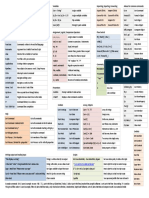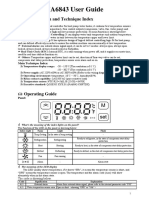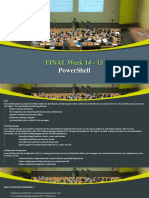PowerShell Commands
Uploaded by
Sarwar Pasha MohammedPowerShell Commands
Uploaded by
Sarwar Pasha MohammedAn A-Z Index of Windows PowerShell commands
a Get-Acl Get permission settings for a file or registry key Set-Acl Set permissions Get-Alias gal Return alias names for Cmdlets Import-Alias ipal Import an alias list from a file New-Alias nal Create a new alias. Set-Alias sal Create or change an alias Get-AuthenticodeSignature Get the signature object associated with a file Set-AuthenticodeSignature Place a signature in a .ps1 script or other file c Set-Location cd/chdir/sl Set the current working location Get-ChildItem dir/ls/gci Get child items (contents of a folder or registry key) Get-Command gcm Retrieve basic information about a command Measure-Command Measure running time Trace-Command Trace an expression or command Add-Content ac Add to the content of the item Get-Content cat/type/gc Get content from item (specific location) Set-Content sc Set content in the item (specific location) Clear-Content clc Remove content from a file/item ConvertTo-Html Convert the input into an HTML table ConvertFrom-SecureString Convert a secure string into an encrypted standard string ConvertTo-SecureString Convert an encrypted standard string into a secure string Clear-Host clear/cls Clear the screen Clear-Item cli Remove content from a variable or an alias Copy-Item copy/cp/cpi Copy an item from a namespace location Get-Credential Get a security credential (username/password) Get-Culture Get region information (language and keyboard layout) d Get-ChildItem dir/ls/gci Get child items (contents of a folder or registry key) Get-Date Get current date and time Set-Date Set system time on the host system Remove-Item del/erase/rd/rm/rmdir Remove an item Do Loop while a condition is True Get-PSDrive gdr Get drive information (DriveInfo) New-PSDrive mount/ndr Install a new drive on the machine Remove-PSDrive rdr Remove a provider/drive from its location e Get-Eventlog Get eventlog data Get-ExecutionPolicy Get the execution policy for the shell Set-ExecutionPolicy Change the execution policy (user preference) Export-Alias epal Export an alias list to a file Export-Clixml Produce a clixml representation of powershell objects Export-Console Export console configuration to a file Export-Csv epcsv Export to Comma Separated Values (spreadsheet) Invoke-Expression Run a PowerShell expression Exit Exit Powershell (or exit a script) f ForEach-Object foreach Loop for each object in the pipeline ( % )
ForEach Loop through values in the pipeline For Loop through items that match a condition Format-Custom fc Format output using a customized view Format-List fl Format output as a list of properties, each on a new line Format-Table ft Format output as a table Format-Wide fw Format output as a table listing one property only g Get-Item gi Get a file/registry object (or any other namespace object) Get-ChildItem dir/ls/gci Get child items (contents of a folder or registry key) h Get-Help help Open the help file Add-History Add entries to the session history Get-History history/h/ghy Get a listing of the session history Invoke-History r/ihy Invoke a previously executed Cmdlet Get-Host Get host information (PowerShell Version and Region) Clear-Host clear/cls Clear the screen Read-Host Read a line of input from the host console Write-Host Display message on screen i if Conditionally perform a command Import-Clixml Import a clixml file and rebuild the PS object Import-Csv ipcsv Take values from a CSV list and send objects down the pipeline. Get-Item gi Get a file object or get a registry (or other namespace) object Invoke-Item ii Invoke an executable or open a file (START) New-Item ni Create a new item in a namespace Remove-Item rm/del/erase/rd/ri/rmdir Remove an item Set-Item si Change the value of an item Clear-ItemProperty Delete the value of a property Copy-ItemProperty Copy a property along with its value Get-ItemProperty Retrieve the properties of an object Move-ItemProperty Move a property from one location to another New-ItemProperty Set a new property of an item at a location Remove-ItemProperty Delete the property and its value from an item Rename-ItemProperty Rename a property of an item Set-ItemProperty Set the value of a property k Stop-Process kill/spps Stop a running process l Get-Location pwd / gl Get and display the current location Pop-Location popd Set the current working location from the stack Push-Location pushd Push a location to the stack Set-Location cd/chdir/sl Set the current working location m Add-Member Add a member to an instance of a PowerShell object Get-Member gm Enumerate the properties of an object Move-Item move/mv/mi Move an item from one location to another o Compare-Object Compare the properties of objects Group-Object group Group the objects that contain the same value for a common property
Measure-Object Measure the properties of an object New-Object Create a new .Net object Select-Object select Select properties of objects Sort-Object sort Sort objects by property value Where-Object Filter the objects passed along the command pipeline. Out-Default Send output to default Out-File Send command output to a file Out-Host oh Send the pipelined output to the host Out-Null Send output to null Out-Printer lp Send the output to a printer Out-String Send objects to the host as strings p Powershell Launch a powershell session Convert-Path cvpa Convert a ps path to a provider path Join-Path Combine a path and child-path Resolve-Path rvpa Resolves the wildcards in a path Split-Path Return part of a path Test-Path Return true if the path exists, otherwise return false Get-Pfxcertificate Get pfx certificate information Pop-Location popd Set the current working location from the stack Push-Location pushd Push a location to the stack Get-Process ps/gps Get a list of processes on a machine Stop-Process kill/spps Stop a running process Clear-ItemProperty clp Remove the property value from a property Copy-ItemProperty cpp Copy a property along with it's value Get-ItemProperty gp Retrieve the properties of an object Move-ItemProperty mp Move a property from one location to another New-ItemProperty Set a new property Remove-ItemProperty rp Remove a property and its value Rename-ItemProperty rnp Renames a property at its location Set-ItemProperty sp Set a property at the specified location to a specified value Get-PsProvider Get information for the specified provider Set-PSdebug Turn script debugging on or off Add-PsSnapIn Add snap-ins to the console Get-PsSnapin List PowerShell snap-ins on this computer Remove-PSSnapin Remove PowerShell snap-ins from the console q Quest AD cmdlets Read and write to Active Directory r Read-Host Read a line of input from the host console Remove-Item rm/del/erase/rd/ri/rmdir Remove an item Rename-Item ren/rni Change the name of an existing item Rename-ItemProperty Rename a property of an item Run/Call & Run a command (call operator) s Select-Object select Select properties of objects Get-Service gsv Get a list of services New-Service Create a new service Restart-Service Stop and then restart a service Resume-Service Resume a suspended service Set-Service Change the start mode/properties of a service Sort-Object sort Sort objects by property value Start-Service sasv Start a stopped service Stop-Service spsv Stop a running service Suspend-Service Suspend a running service Start-Sleep sleep Suspend shell, script, or runspace activity Switch Multiple if statements
Select-String t Tee-Object New-Timespan Trace-Command Get-Tracesource tracing. Set-Tracesource Start-Transcript Stop-Transcript u Get-Uiculture Get-Unique gu Update-Formatdata Update-Typedata configuration v Clear-Variable clv Get-Variable gv New-Variable nv Remove-Variable rv Set-Variable set/sv w Where-Object where Where While Get-WMIobject gwmi Write-Debug Write-Error Write-Output echo Write-Progress Write-Verbose Write-Warning # $variable = "value" "value" @(...)
Search through strings or files for patterns Send input objects to two places Create a timespan object Trace an expression or command Get components that are instrumented for Trace a PowerShell component Start a transcript of a command shell session Stop the transcription process Get the ui culture information Get the unique items in a collection Update and append format data files Update the current extended type Remove the value from a variable Get a powershell variable Create a new variable Remove a variable and its value Set a variable and a value Filter input from the pipeline ( ? ) Filter objects from the pipeline Loop while a condition is True Get WMI class information Write a debug message to the host display Write an object to the error pipeline. Write an object to the pipeline Display a progress bar Write a string to the host's verbose display Write a warning message Comment / Remark Define a variable also: ${vari!ab#le} = Force an expression to be evaluated as a List
In addition to the above, Powershell can also run all the standard XP commands (apart from internal commands), plus VBScript and Resource kit utilities.
You might also like
- Course: 10961 Automating Administration With Windows PowerShell100% (7)Course: 10961 Automating Administration With Windows PowerShell519 pages
- An A-Z Index of Commands: Windows PowershellNo ratings yetAn A-Z Index of Commands: Windows Powershell8 pages
- Administrators Guide To Windows PowerShell RemotingNo ratings yetAdministrators Guide To Windows PowerShell Remoting38 pages
- PowerShell Quick Reference Dimension IT v2.9 PDFNo ratings yetPowerShell Quick Reference Dimension IT v2.9 PDF2 pages
- Basic Commands For Powershell: Configuring Windows PowerShell and Working With Basic Commands100% (2)Basic Commands For Powershell: Configuring Windows PowerShell and Working With Basic Commands14 pages
- Powershell Cheat Sheet: Powershell For Pen-Tester Post-Exploitation Useful Cmdlets (And Aliases)No ratings yetPowershell Cheat Sheet: Powershell For Pen-Tester Post-Exploitation Useful Cmdlets (And Aliases)2 pages
- An A-Z Index of Commands: Windows PowershellNo ratings yetAn A-Z Index of Commands: Windows Powershell8 pages
- The PowerShell Scripting and Toolmaking BookNo ratings yetThe PowerShell Scripting and Toolmaking Book105 pages
- 40 Most Useful PowerShell and Command Prompt Commands For Windows Administrators100% (1)40 Most Useful PowerShell and Command Prompt Commands For Windows Administrators63 pages
- 10 Powershell Commands Every Windows Admin Should Know 10 Things TechrepublicNo ratings yet10 Powershell Commands Every Windows Admin Should Know 10 Things Techrepublic3 pages
- A To Z List of All Windows CMD Commands - HELLPCNo ratings yetA To Z List of All Windows CMD Commands - HELLPC12 pages
- 100 Shortcuts For Windows Run Commands (Windows)No ratings yet100 Shortcuts For Windows Run Commands (Windows)2 pages
- 40 Most Useful PowerShell and Command Prompt CommandsNo ratings yet40 Most Useful PowerShell and Command Prompt Commands62 pages
- WindowWindows PowerShells PowerShell - Compressed75% (4)WindowWindows PowerShells PowerShell - Compressed84 pages
- 30 Basic Powershell Commands To Start With Windows Server - @TheTunnelixNo ratings yet30 Basic Powershell Commands To Start With Windows Server - @TheTunnelix5 pages
- Active Directory Rights Management Services A Clear and Concise ReferenceFrom EverandActive Directory Rights Management Services A Clear and Concise ReferenceNo ratings yet
- An A-Z Index of Windows PowerShell CommandsNo ratings yetAn A-Z Index of Windows PowerShell Commands7 pages
- Warranty: U.S. Epa Emission Control Warranty Statement Your Warranty Rights and ObligationsNo ratings yetWarranty: U.S. Epa Emission Control Warranty Statement Your Warranty Rights and Obligations6 pages
- NIBF List of Exhibitors - 2008 Exhibtors: S/N Organisations' Name Fixed PhonesNo ratings yetNIBF List of Exhibitors - 2008 Exhibtors: S/N Organisations' Name Fixed Phones12 pages
- University of Oxford Estates Services: Building Design PhilosophyNo ratings yetUniversity of Oxford Estates Services: Building Design Philosophy15 pages
- Extractive Fermentation of Acetone And: Butanol: Process Design and Economic EvaluationNo ratings yetExtractive Fermentation of Acetone And: Butanol: Process Design and Economic Evaluation10 pages
- Issues in Evaluating Capacity of Rock Socket Foundations KULHAWY and PRAKOSONo ratings yetIssues in Evaluating Capacity of Rock Socket Foundations KULHAWY and PRAKOSO11 pages
- API 614-Chapter 4 DATA SHEET Dry Gas Seal Module Si Units: System Responsibility: (2.1.2)No ratings yetAPI 614-Chapter 4 DATA SHEET Dry Gas Seal Module Si Units: System Responsibility: (2.1.2)10 pages
- A Perfect Way of Fluid Handling: Industrial ValvesNo ratings yetA Perfect Way of Fluid Handling: Industrial Valves12 pages
- A Two Phase Multi-Attribute Decision-Making Approach For New Product IntroductionNo ratings yetA Two Phase Multi-Attribute Decision-Making Approach For New Product Introduction16 pages































































































